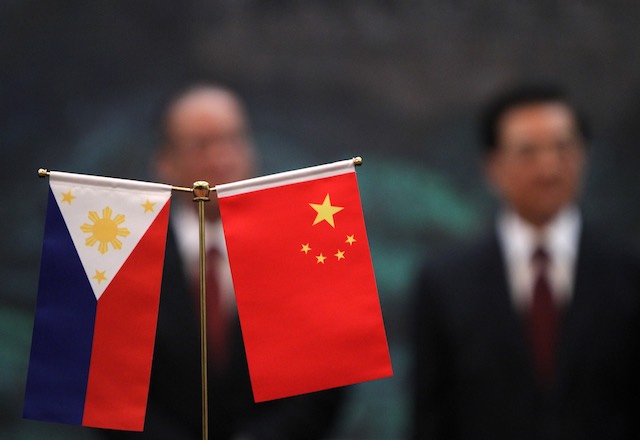 During the latest edition of Shangri-La Dialogue, which gathers defense ministers and leading experts from around the world in Singapore annually, I couldn’t but not notice that the Philippines’ arbitration case against China was a major theme in formal and informal exchanges among participants.
During the latest edition of Shangri-La Dialogue, which gathers defense ministers and leading experts from around the world in Singapore annually, I couldn’t but not notice that the Philippines’ arbitration case against China was a major theme in formal and informal exchanges among participants.
Though we got among the weakest armed forces in Southeast Asia, and feature among the poorer nations in the world, the Aquino administration’s decision to take China to international court has put the country in the international spotlight. Seldom do mid-sized nations gain so much global attention and sympathy. The arbitration case, which is expected to finalize in coming weeks and produce a largely unfavorable outcome for China, is viewed as a classic ‘David vs. Goliath’ showdown by much of the international community.
By skillfully repackaging our case as one of sovereign rights and maritime entitlement claims – rather than sovereign claims, which transcends the mandate of the UNCLOS – we have, thankfully, overcome both jurisdictional and admissibility hurdles. Through our arbitration case, we have rallied the international community to our cause. But this is more than just a moral issue and empty rhetoric. There are significant strategic implications too.
The arbitration case, as I explained in an earlier piece, provides a tangible, concrete legal basis for major global powers to push back against China’s purported plans to turn the West Philippine Sea into their blue “national soil”. No less than Japan, Asia’s sleeping giant, is looking forward to a favorable arbitration verdict that may provide the legal green light to deploy Maritime Self Dense Forces – Asia’s most advanced naval force – to join American-led Freedom of Navigation Operations (FONOPs) in the West Philippine Sea.
Other major powers, from France to India and Britain, may also follow suit. Over the past year, a growing number of countries have come to support the Philippines’ arbitration case. All the members of the Group of Seven (G7) industrialized powers, Australia, and almost all relevant players in the region have openly or indirectly expressed their support.
In fact, Indonesia and Vietnam, which are observers at the Philippine-initiated arbitration proceedings, have even gone so far as threatening a similar action against China, which has stepped up its fishing activities and para-military patrols far into Vietnamese, Malaysia, and Indonesian waters. In short, the Philippines is not alone. Others are following us, not the other way around.
Some would even go so far as stating that we are now the de facto leaders of an emerging coalition to pressure China into following prevailing international law and question the validity of its expansive claims, which are based on dubious historical arguments. No wonder then, China is in a state of panic, and is calling on the incoming Duterte administration to drop the case as a precondition for bilateral engagement.
A panicked China has lashed out at the arbitration proceedings and in a comically desperate fashion has sought to undermine the legitimacy of the arbitration body by setting up its own international courts and rallying up to 40 countries – mostly poor and many landlocked – to question the Philippines’ arbitration maneuver. The arbitration case is the Philippines’ best leverage to exact concessions from China. Without the arbitration case, there is little reason for China to make any reasonable compromise. This is the geopolitical reality.
21st Century Revisionism
"We were not isolated in the past, we are not isolated and we will not be isolated," Chinese Admiral Sun Jianguo, deputy chief of general staff of the People's Liberation Army, exclaimed during the recently-concluded Shangri-La Dialogue in Singapore. It was a direct riposte to US Secretary of Defense Ash Carter’s earlier speech at the same event, where he warned China against “self-isolation” due to its aggressive maneuver in adjacent waters.
Not short of bravado, the Chinese admiral went so far as stating Beijing does not "make or fear trouble" against the "provocations of certain countries for their own selfish interests." The speech coincided with reports of China’s back-to-back (unsafe) interception of American surveillance missions in the South China Sea.
Four centuries after the publication of British jurist John Selden’s "The Closed Sea," which argued for exclusive sovereign control of international waters, China is inching closer to transforming the South China Sea – the world’s most important waterway, which handles up to a third of global maritime commerce, 4 times as much energy transport as the Suez canal, and more than a tenth of global fisheries stock – into a virtual domestic lake.

China’s control of the Paracel chain of islands is a fait accompli, while the Pratas chain of islands are under the administration of what Beijing considers as a renegade province, Taiwan, which will be eventually re-incorporated into a Greater China. In the last two years or so, China has reclaimed 3200 acres (1,295 hectares) of land to build gigantic artificial islands in Spratly chain of islands, giving birth to a sprawling network of civilian and military installations across the disputed waters. Soon, China may be in a position to establish an ‘exclusion zone’ in the area, imperiling freedom of overflight and navigation for regional and external military forces in the area.
Standing next to a top Vietnamese defense official, Deputy Minister of Defense Nguyen Chi Vinh, he warned that “some countries are expanding their invasion of the South China Sea” – most likely in reference to allegations that Vietnam has also engaged in, albeit on a far smaller scale, its own reclamation activities in the area in recent years. Admiral Sun, however, reserved his most pugnacious rhetoric for one Southeast Asian country, the Philippines, which has dared to take its giant neighbor to international court over the maritime disputes.
Starting off on a relatively conciliatory note, where he proudly enumerated China’s numerous contributions to global security and development, the Chinese admiral suddenly shifted to a high-pitch, lambasting Manila for supposedly breaching bilateral agreements with China and denying its rights in the disputed waters. I couldn’t but feel shocked and perturbed by these statements, sitting not too far from the podium.
He warned the Philippines and other likeminded countries that “Chinese people believe in truth, not heresy” and that “belligerence doesn’t make peace”. Quite astonishingly, he accused the Philippines of becoming “the first country to invade the South China Sea”, recounting how he internalized this humiliating event during his younger years as a serviceman.
Admiral Sung was also adamant that from the perspective of (Chinese) history, the South China Sea belongs to Beijing. And that this is a self-evident truth. It was a speech that was both disconcerting and surreal, especially when one takes a close look at actual realities on the ground. The sheer scale, speech and technological sophistication of China’s reclamation activities, the ever-larger deployment of Chinese fishermen-cum-militia forces, the augmentation of Chinese submarine and naval presence in the area, not to mention an uptick in Chinese aerial interception of foreign reconnaissance aircrafts in the South China Sea – they all underscore Beijing’s intent on dominating what it describes as its blue “national soil”.
Safeguarding the Commons
"The Sea, by the Law of Nature or Nations, is not common to all men, but capable of private Dominion or proprietie as well as the Land," Selden wrote in the The Closed Sea (Mare clausum) in 1635. It was a direct rebuttal of Dutch Jurist Hugo Grotius’ influential book, The Free Sea (Mare Liberum), which served as the foundation of modern international law, particularly the United Nations Convention on the Law of the Sea (UNCLOS). For Grotius, high seas are global commons that, by their very nature, should be accessible to the entire humankind on a non-exclusive basis.
Over the next two centuries, America introduced the Monroe Doctrine as a justification for domination of the Americas, to be followed by Alfred Thayer Mahan’s call for American domination of adjacent waters, beginning with the Caribbean. America’s quest for naval domination would extend, over the next decades, across much of the Pacific Ocean, culminating in the occupation of the Spanish-controlled Philippines during the twilight years of the 19th century. The West, in short, was the greatest opponent of Grotius’ doctrine of global maritime commons.
Over the past 7 decades, however, America has served as a largely benign naval behemoth, serving as the anchor of the regional liberal order, which has undergirded a robust free trade regime that has lifted one Asian country after the other, including former adversaries like China, from the depths of poverty to the heights of unprecedented wealth. But all of this could change, thanks to China’s embrace of Seldenean notion of ‘Closed Sea’ and Mahanian doctrine of dominating adjacent waters. No less than the South and East China Sea have, as I argue in my latest book, turned into “Asia’s new battlefield” for domination.
As the President Xi Jinping bluntly put it, in their view, all the “islands and reefs in the South China Sea are Chinese territory since ancient times.” Leaving little doubt as to China’s determination to assert its historical claims in the South China Sea, Xi warned, “Chinese people will not allow anyone to infringe on China’s sovereignty and related rights and interests in the South China Sea.”
But the election of Rodrigo Duterte has raised certain questions, especially among our allies. The incoming President Duterte has openly called for direct engagement with China and, if conditions permit, expressed his willingness to negotiate a joint development agreement in disputed waters. For him, what matters more is reviving long-frayed bilateral ties and welcoming more Chinese investments in the country. For this reason I consider him a pragmatic realist in international affairs.
A Duterte administration may mean improved bilateral relations with China, and that is desirable. It is important for the Philippines and China to not allow their bilateral differences to define their overall relationship. But at what cost? Reopening communication channels with China may lead to demands for certain Filipino concessions on the arbitration case as well as security agreements with allied nations. So the Duterte administration should be very careful in any prospective bilateral negotiation in the future, which is indispensable but should be unconditional. As Machiavelli would put it, keep your friends close, but your rivals even closer. Even the UNCLOS encourages parties with overlapping claims to consider bilateral negotiations, assuming they can bear fruit.
Obviously, as the Chinese occupation of Scarborough Shoal and our succeeding exchanges demonstrate, bilateral talks are useless when you got no leverage, precisely what the arbitration case provides us. So we should stick with the arbitration case and fully leverage any prospective favorable outcome to have a stronger hand in any direct dealings with China. And I am confident that the Duterte administration will do its utmost to protect our national interest in line with prevailing international law. – Rappler.com
Richard J. Heydarian teaches political science at De La Salle University and is a regular contributor to the Asia Maritime Transparency Initiative of the Center for Strategic and International Studies (CSIS) in Washington DC. His latest book is Asia's New Battlefield: US, China, and the Struggle for Western Pacific (Zed, London), now available at National Bookstore and Powerbooks. This piece was partly based on an earlier essay for The National Interest.